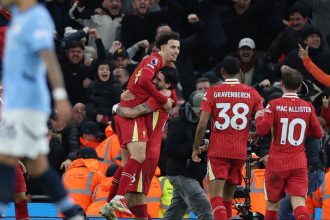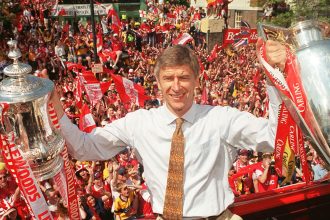The MLS commissioner addressed several pressing issues, including a potential schedule change and spending power for Inter Miami, Seattle in CWC
CARSON, Calif. – Major League Soccer Commissioner Don Garber looked at the gathered media at the Dignity Health Sports Park's Stadium Club Area Friday and pointed to the obvious.
"It's hard to believe was our first true soccer complex," Garber said. "Think about what that means. This week, we broke ground on NYCFC's new stadium in Queens – over 10 years in the making. When that stadium, along with Inter Miami's new stadium, comes online, we will have 28 soccer stadiums that have been built, which is remarkable."
MLS has come along way since the last time the Galaxy hosted a title game in 2014, with vast improvements in infrastructure and expansion in key markets. Yet, there are plenty of challenges ahead – from more transparency on the impact of what the Apple TV pact is doing for the league to the MLS roster spend.
Garber, who this week extended his contract through 2027, touched on all of that in more in his State of the League address, one day before the LA Galaxy host New York Red Bulls for the 2024 MLS Cup. GOAL look at the key takeaways.
Get the MLS Season Pass today!Stream games nowPotential schedule changes
With two major FIFA international tournaments in the U.S. over the next two summers – the 2025 Club World Cup and the 2026 World Cup – there has been plenty of speculation of potential switch of schedule for MLS.
Garber said that MLS will not play during the 2026 World Cup and will take to-be-determined break for the Club World Cup next summer (which also coincides with the Gold Cup in the U.S.) Outside of those two competitions, the Commissioner didn't offer specifics about potential changes, but did outline the challenges in doing so. It's been reported that the league is considering a fall-to-spring schedule.
"We could be the only league, or one of only two leagues in the world that works on our schedule," Garber said. "It's complicated. And I say this to all of you regularly – we're across three time zones, multiple weather factors. We're traveling across a continent, and making those changes is something we've got to be very, very thoughtful about. I do think that we are considering more than ever before this opportunity to change, but it's not something that we're ready to talk about right now.
"We've got a lot of work to do and that work is ongoing."
AdvertisementGetty Images SportThe impact of FIFA Club World Cup
Like many observers of Thursday's Club World Cup draw, Garber was sympathetic of the Seattle Sounders' plight in next year's tournament. Both Seattle and Inter Miami will represent MLS in the 32-team field.
"We're proud to have the Seattle Sounders with a pretty tough draw," Garber said with a smirk before adding. "We proud to have Inter Miami, our record-setting Supporters' Shield winner, representing our league. It's a chance for us to showcase our growing competitiveness on the global stage against the world's best clubs in meaningful matches."
Garber was also asked how MLS teams can be competitive in the tournament, considering the differences between the North American league's payroll and ones around in Europe and South America. Garber acknowledged MLS clubs are on the lower end of overall transfer market value on the global stage, and mentioned there could be changes following the next board meeting for the two participants in the tournament.
"We're working on ways that we can provide each team with some opportunity to be more competitive," Garber said.
Garber seemed to indicate a desire for all of MLS clubs to more proactive in growing their fanbases to justify adding more resources to roster spending.
"There's been a year work on what kind of things we need to do, specifically, to grow our fan base," he said.
Garber pointed to a wide range of topics that league is exploring, including finding content partners to better tell its story, to looking at changes to the competitive structure of the league.
"I don't have an answer to it," he said, "but we're looking at it now that we'll have 30 teams. We have the same playoff format, [or] maybe we don't. But all those things will go into, you know, a pathway to grow our fan base and make our league more competitive."
Getty Images SportConflicts with U.S. Open Cup, Leagues' Cup
Garber received criticism for his decision to largely pull MLS clubs out of the U.S. Open Cup last year. He was emphatic in largely reversing that decision in his remarks Friday.
"We will participate in the U.S. Open Cup again next year, we will likely have more teams, and believe that tournament play, if we could manage it with 30 teams, where at least a team at each team is in one tournament, is good for the club. It's good for the fans," he said.
He added, "We want teams to have an opportunity to lift a trophy, and maybe if some of them can live multiple lift multiple trophies, that's a good thing. But it is going to be nearly impossible for all teams to be able to participate in all tournaments. It's just not enough games during the schedule, with or without any change in the calendar."
When MLS reduced participation in the Open Cup, some fans protested the Leagues Cup, contested between MLS and Liga MX. Garber admitted the tournament needs improvement and said there could be changes for next season.
"I think we need more MLS vs. Liga MX matches," he said. "That was really the point of the Leagues Cup in the beginning."
Despite the issues of Year 2, Garber stands behind the tournament.
"It worked super well on the first year," he said. "That was not just about Lionel Messi, it was just the way the tournament laid out. And we're looking at modifications that will, I think, make it more focused on what it is that we're trying to achieve, which is this great rivalry between our two leagues."
Getty Images SportThe impact of Apple TV
As one of the league's accomplishments, Garber pointed to the fact that viewers on Apple TV watch 65 minutes out of an average 90 minute match on the streaming service – highlighting the strong engagement on the platform. He did not offer any addition insight into the streaming data of MLS Season Pass.
For all the growth MLS has seen with its attendance numbers, its decades-long challenge has been solving how to become a more appealing product on TV – a significant source of revenue for all sports leagues around the world. With Apple TV's MLS Season Pass numbers still very much shrouded in secrecy, it has led to concerns that the product might not be drawing strong viewership.
Garber mentioned that with the shift from linear to streaming services being a relatively new phenomenon, both parties are still determining what the success metrics are in this new landscape.
"I also want to point out that this is a new world for all of us," he said. "As we get into a world of streaming, the entire industry has got to figure out a new metric. Is that metric, average minute audience? Is it unique viewers? How could we figure out the way to compare the audiences that we've had in the past to the audiences that we have now? How important is subscriptions to viewership? To us, subscriptions are very important."
He added, "Somebody's paying for the opportunity to watch a game, so when they do watch it, it is intentional. That's leading to the 65-minute time that people are spending on our games. But we are very pleased with those viewership numbers."
He also noted that having more structured programming, with most games being played on Saturdays and a select set being played on Wednesdays, has paid dividends.






